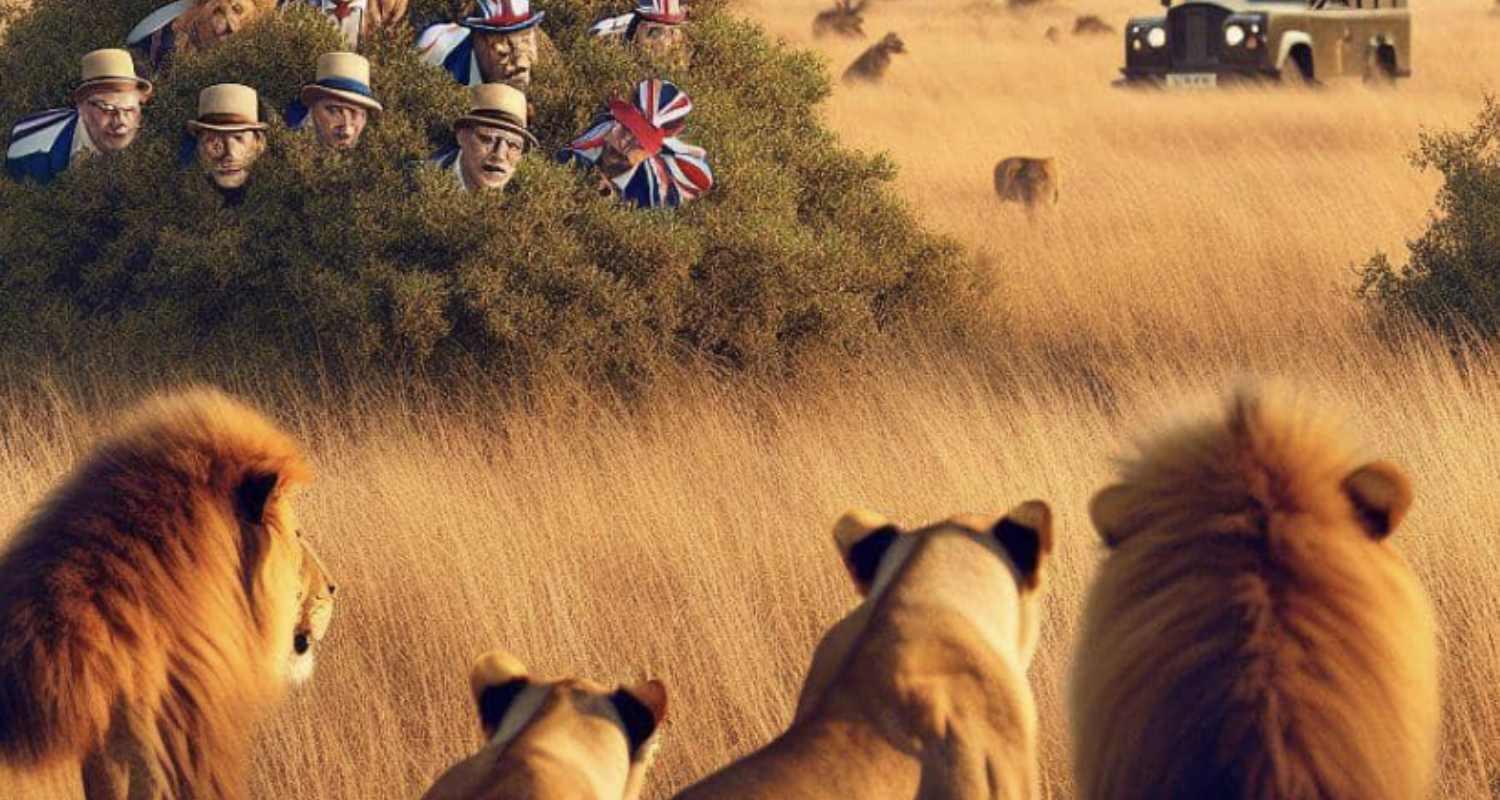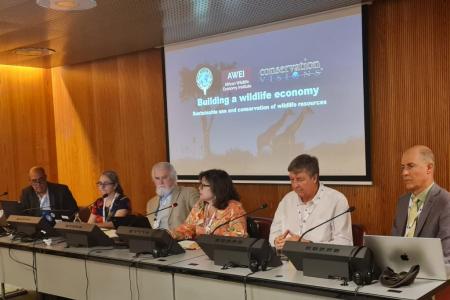
The UK’s trophy hunting import ban risks undermining wildlife conservation efforts
The UK’s Conservative Party 2019 manifesto committed to banning the imports of hunting trophies, and for the last year a bill to do this was debated in the House of Commons, and eventually stalled in the House of Lords. The bill, oddly, is not at all aligned with the international policy practice regarding the use of wild species – policies which the UK has also committed to support.
At the conference of the Convention on Biological Diversity (CBD) last December, the participant countries, including the UK, adopted a decision (15/23) “to promote the mainstreaming of the sustainable use of biodiversity, in particular that of wild species, into all relevant sectors.” Relevant sectors for the use of wild species include tourism, which, in turn, includes fishing and hunting tourism. Trophies are imported by hunting and fishing tourists. Further, at the CBD conference, the UK was a strong supporter of another decision (15/17) on the importance of “mainstreaming biodiversity within and across sectors.” Tourism, including hunting and fishing, is a most appropriate sector for mainstreaming biodiversity and wildlife use.
At the conference, the parties also adopted the Kunming-Montreal Global Biodiversity Framework (GBF) (decision 15/4) with explicit targets for the use of wild species:
- Target 5 – “ensure that the use, harvesting and trade of wild species is sustainable, safe and legal.”
- Target 9 – “ensure that the management and use of wild species are sustainable, thereby providing social, economic and environmental benefits for people.”
The UK has demonstrated its support for the GBF by being one of the first countries to contribute to a new GBF fund. The UK Government has also committed to implementing the Framework domestically, which presumably includes enabling British citizens to engage in wildlife tourism (viewing, hunting, and fishing) at home and abroad.
So as a Party to the CBD, the UK along with over 190 governments has committed to mainstreaming the use of wild species into all relevant sectors, to ensuring that the use of wild species is sustainable and legal, and to ensuring that the use of wild species benefits people. One might ask how the banning of trophies from hunting tourism supports these commitments.
The Hunting Trophies (Import Prohibition) Bill focuses on endangered wild animals, and rather than supporting measures to ensure that the use of these animals is legal, sustainable, and benefiting people, it proposes to make the import of trophies from these species illegal. Interestingly, long after the UK left the EU, the proposed legislation depends on EU Wildlife Trade Regulations to determine whether a species is endangered. The EU regulations include two lists of endangered species – Annex A and Annex B which are generally but not entirely the same as Appendix I and Appendix II, respectively, of the Convention on International Trade in Endangered Species of Wild Fauna and Flora (CITES).
The UK is not a Member State of the EU, but it is a Party to CITES. So how does the proposed trophy ban relate to the UK’s commitments under CITES? Wild species considered to be threatened by international trade are listed on CITES Appendices. The UK government adheres to these Appendices and provides clear guidance to importers and exporters requesting a permit for CITES-listed species.
For those species on Appendix II, an export permit is needed which in turn requires a finding by the exporting country that the trade would be non-detrimental, and the wildlife product was legally acquired. For those species on Appendix I, in addition to this export permit, an import permit is needed from the importing country also based on a finding that the trade would be non-detrimental and that the import will “not to be used for primarily commercial purposes.”
For the import of wildlife products from Appendix I species, an import permitting system is already in place in the UK. The proposed trophy import ban would make this system redundant undermining the UK’s position as a Party to CITES. For species listed on Appendix II, the CITES Parties have agreed that the decision whether to trade should be made by the exporting country. Hence, a trophy import ban by the UK would be not only undermine the UK’s position with respect to CITES, it would also be a clear statement that the UK does not recognise the decisions of exporting countries regarding their management of their wildlife. Southern Africans, in particular, have expressed concerns of neocolonialism.
As explained by Ivonne Higuero, the Secretary General, “CITES aims to ensure that international trade in specimens of wild animals and plants does not threaten the survival of species in the wild.” She emphasises that “In many or most cases, international trade in CITES listed species will not be a risk to their survival in the wild,” and, importantly for the UK Government, “Stopping trade should always be a matter of last resort, as it could undermine conservation efforts and livelihood benefits of sustainable species management.”
The international mandate for the legal use, harvesting, and trade of wild species as agreed under the CBD and as regulated under CITES provides a multilateral framework for countries like to UK to be promoting rather than stopping wildlife trade – trade that in turn supports conservation and provides benefits to people. Rather than banning the imports of trophies from hunting tourism, the UK ought to be playing a leadership role in mainstreaming the use of wild species into all relevant sectors.
Dr Francis Vorhies is the Director of the African Wildlife Economy Institute at Stellenbosch University, and a Research Visitor at the Wildlife Conservation Research Unit at the University of Oxford.
Originally published on the Institute of Economic Affairs website on 27 November 2023
-

Dr Francis Vorhies
AWEI Director
We support the free flow of information. Please share:
More content
-

Drivers of hunting and photographic tourism income to communal conservancies in Namibia
Mr Joseph Goergen …Hunting and photographic tourism provide ecosystem services that can facilitate conservation. Understanding factors influencing how tourism industries generate...
2024Research -

SANParks Vision 2040: A New Era for Conservation in South Africa
Mrs Emily TaylorReimagining Conservation: SANParks' Vision 2040
South African National Parks (SANParks) has unveiled its ambitious Vision 2040, a…
Articles -

In defence of wild meat’s place at the table
Tim VernimmenQ&A — Conservation scientist E.J. Milner-Gulland
Sustainable and safe consumption of wildlife is possible, and important for those…
Articles -

The diverse socioeconomic contributions of wildlife ranching
Candice Denner…The diverse socioeconomic contributions of wildlife ranching are increasingly recognized as a vital element of sustainable development, particularly...
2024Research -

A conflict of visions: Ideas shaping wildlife trade policy toward African megafauna
Mr Michael 't Sas-Rolfes…The issue of wildlife trade is a major concern for the conservation of African megafauna, such as elephants...
2024Research -

Barriers to the Participation of the Traditional Leadership Institution in Promoting Rural Agricultural Development
Dr Wiseman Ndlovu…The Traditional Leadership Institution (TLI) is constitutionally recognised to promote rural development in South Africa. It works with...
2022Research -

Elephant in the Room - Why a trophy hunting ban would hurt conservation and development
Dr Francis Vorhies“Trophy hunting, if well managed, conserves wild species and habitats and enhances livelihoods in rural communities.” - Dr...
2024Briefs -

Biodiversity means business: Reframing global biodiversity goals for the private sector
Dr Francis Vorhies…The Convention on Biological Diversity strategic goals direct the conservation and sustainable use of biodiversity from global to...
2019Research -

The 33rd Meeting of the Animals Committee of the Convention on International Trade in Endangered Species of Wild…
Articles
Get updates by email
Through impactful research, stakeholder engagement, and professional development, AWEI is supporting the wildlife economy across Africa. Please subscribe for occasional updates on our work and forthcoming events.
Sign up for a quarterly dose of AWEI insights
In a complex and changing world, AWEI generates strategic ideas, conducts independent analysis on wildlife economies, and collaborates with global scholar-practitioners to provide training and expertise for biodiversity conservation, climate resilience, and inclusive economic opportunities in Africa.
